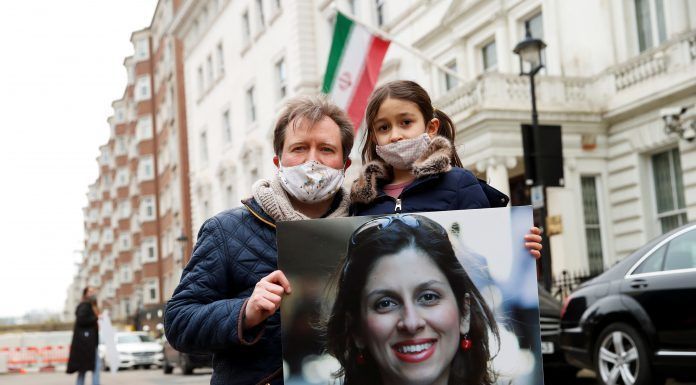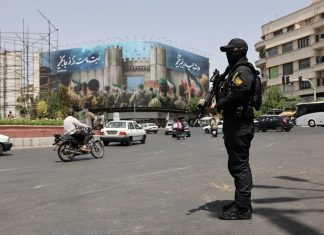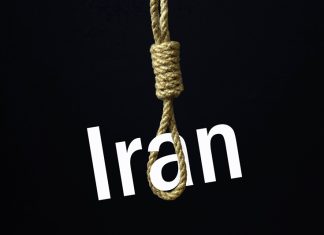A new law in Iran that transfers the power to grant and revoke lawyers’ licenses from the Iranian Bar Association (IBA) to the judiciary could make it easier for the government to detain individuals for financial gain, according to Richard Ratcliffe, the husband of Nazanin Zaghari-Ratcliffe.
The legislation was approved by the outgoing judiciary chief Ebrahim Raisi — who is Iran’s President-elect — on June 18 and ratified by the judiciary on June 23. it allows judges to deny and revoke licenses to lawyers who breach “legal and religious norms.”
Raisi will begin his tenure as president on Aug. 5, after he has selected ministers for his cabinet. Gholam-Hossein Mohseni-Eje’i is the newly elected head of Iran’s judiciary. Both men have been sanctioned by the United States for human rights violations.
Speaking to Kayhan Life, Ratcliffe — whose wife Nazanin was sentenced to a further year in prison on April 26, after serving a five-year jail term for “plotting to topple the Iranian government” — said the government was increasingly using its legal system as a way to raise money internationally.
“With political prisoners we always focus on the politics of imprisonment, but increasingly in Iran we should see it as a business. The prison system in Iran is a shakedown: of minorities, of foreigners, of elites fallen out of favor. I see this latest move as just an attempt to make that business more streamlined,” he said.
“Under Raisi and Eje’i, we are witnessing the complete subordination of Iran’s legal system into a branch of Iran’s security services, so that it can serve both as an instrument of control, and more nakedly as a tool of extortion.”
Lawmakers and analysts believe Zaghari-Ratcliffe’s case is linked to a historic $557 million debt owed to Iran by the UK for tanks ordered by the Shah of Iran shortly before the 1979 Iranian revolution. The tanks were never delivered, leading to a decades-long legal battle between Britain and the Islamic Republic.
Zaghari-Ratcliffe’s constituency representative in the British parliament, Tulip Siddiq, told Kayhan Life in March that Nazanin had been told repeatedly by Iranian officials that her case was tied to the debt.
Lawyers in Iran raised concerns about the new law in a recent article published by Iranian news outlet Emtedad, saying it had further eroded the legal profession’s independence in the country.
The former vice president of the International Bar Association said the new regulations were a breach of the law on the independence of Iran’s bar associations. In an opinion piece for Emtedad, he warned that they would allow the judiciary to interfere with the bar associations’ work.
However, Iran’s Administrative Court of Justice ruled on July 5 that the regulations were lawful, and announced that they would have to be enforced by bar associations across the country.
“Nazanin is now onto her third lawyer: the first two were personally prosecuted for their work on her case, because they were getting in the Islamic Revolutionary Guard Corps’ (IRGC) way. It is getting increasingly hard to find one who dares take on cases like ours, or whose family will let them. At one level, this move means in the revolutionary courts there is simply no prospect of a fair trial,” Ratcliffe said.
Other families with relatives who say they have been arbitrarily detained in Iran are also concerned by the new law. Sherry Izadi — whose husband Anoosheh Ashoori was sentenced to 12 years in Tehran’s Evin prison in 2017 on charges of “cooperating with a hostile state against the Islamic Republic” and “obtaining illicit funds,”— told Kayhan Life that the legislation would place greater pressure on human rights defenders in Iran.
“The latest measure by Iran’s Judiciary will further weaken an already oppressed and strictly controlled field of law practice and make a mockery of prisoners’ right to a fair trial and due process,” she said. “This fresh blow on those brave enough to defend human rights in Iran should be strongly condemned by international communities, and any country that claims to be a champion of fair trials.”
A separate bill, if passed, would activate the death penalty for anyone convicted of “spying or collaborating with enemy states,” and criminalizes the filming of “crime scenes” and the sharing of those videos with “enemy or foreign” networks.
Some human rights groups believe the measures are designed to deter protests and prevent evidence of unlawful activities by Iran’s government being leaked to Western governments.
EXCLUSIVE – U.N. Expert Backs Probe into Iran’s 1988 Killings, Raisi’s Role
The first draft of that bill was passed by Iran’s parliament on June 8, and includes a clause which establishes the creation of a committee “with the authority to determine the crimes committed by individuals,” composed of members from the IRGC, and staff from Iran’s army, intelligence and security forces.
During nationwide protests in Iran in 2019, the government sanctioned an internet blackout and a brutal crackdown on demonstrators by security officials, which led to the deaths of several hundred men, women and children.
https://kayhanlife.com/news/kayhan/internet-blackouts-endanger-lives-of-iranians-says-netblocks-founder/








